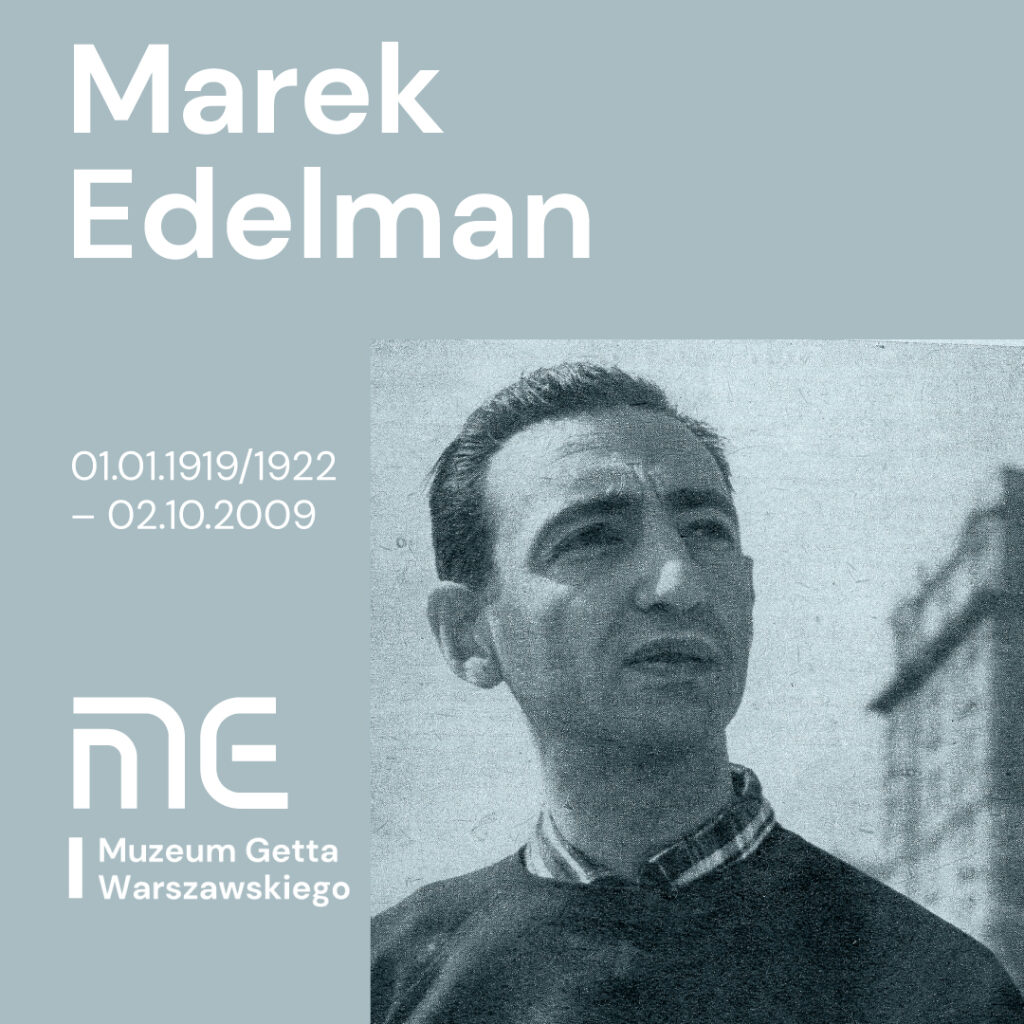Marek Edelman (01.01.1919–02.10.2009)
cardiologist, last commander of the Warsaw Ghetto Uprising, participant in the Warsaw Uprising, Bund member, Knight of the Order of the White Eagle

He was believed to have been born in Gomel on January 1, 1919. His parents, Feliks and Cecylia (née Percowska), were associated with the socialist milieu and the Bund party. After the father’s death in the late 1920s, the family moved to Warsaw, where Felicja was the secretary of the Bund women’s organization JAF (Yiddishe Arbeter Froy, Yiddish Jewish Worker). Her son belonged to the Socialistisher Kinder Farband, a children’s organization belonging to the same party. After losing his mother in 1934, the young Edelman came under the wing of her party comrades, which shaped his attitude and value system for life.
In 1939, he graduated from high school and joined the Cukunft Youth League and later the Bund. After the outbreak of World War II, he set off with his friends for the East, but before reaching Brześć Edelman returned to the capital. He was involved in the conspiracy, edited the underground press of Cukunft. He got a job as a messenger at the Bersohn and Bauman Hospital. With a pass entitling him to leave the ghetto – to take blood samples and sick notes from the wards to the Hygiene Office at Nowogrodzka Street – it enabled him to pass messages behind the wall and contact Bund members hiding on the so-called Aryan side. He himself never chose to hide.
In the summer of 1942 he was one of the co-founders of the Jewish Combat Organization (ŻOB). During the Warsaw Ghetto Uprising, he commanded five ŻOB fighting groups in the so-called Brush Workshop in the area of Świętojerska, Bonifraterska, Franciszkańska and Wałowa Streets. After the death of Mordechaj Anielewicz, he became the last commander of the uprising on behalf of the ŻOB. Edelman, together with a group of insurgents, managed to get to the “Aryan side” through the sewers, through the hatch in ul. Prosta, from where they were transported by truck to the forests of Łomiański. He fought in the Warsaw Uprising in the ranks of the People’s Army and commanded a ŻOB platoon in the Old Town and Żoliborz.
After the war he moved to Łódź and began studying medicine. In 1945, the Central Committee of the Federation published his report entitled “The Ghetto Fights.” After graduating in 1951, he specialized in cardiology under the supervision of Prof. Jana Moll in the Department of Internal Diseases of the Medical College of Lodz. Together they developed a method of performing heart surgery in the event of a severe heart attack. As a result of the 1968 anti-Semitic campaign, Edelman lost his job and his habilitation was rejected. Nevertheless, he did not leave the country, even though his wife Anna Margolis did so with their two children, Alexander and Anna. Thanks to the intervention of the then Prime Minister Józef Cyrankiewicz, he obtained a position as a doctor in the Department of Cardiac Surgery of the Military Medical Academy. At that time he developed a revolutionary method of treating heart disease, combining venous and arterial circulation. From 1972 he was associated with the Mikołaj Pirogów Hospital in Łódź as the head of the intensive care unit.
In the mid-1970s he became involved in the opposition. In January 1976 he was among the signatories of Letter 101 to the Sejm of the People’s Republic of Poland against the amendment of the Constitution. He was active in the Committee for the Defense of Workers and in the Solidarity trade union. After the imposition of martial law he was interned. He took part in the Round Table Talks in the sub-team for health care and was chairman of the Committee for National Minorities. In 1989-93 he was a member of the Sejm, active in Unia Demokratyczna and Unia Wolności. In 1993, Edelman, who was over seventy, went with a humanitarian aid convoy to besieged Sarajevo, and in 1999 he called for intervention in Kosovo to defend oppressed Albanians at NATO. He spent the last years of his life in Warsaw, where he died on October 2, 2009. He was buried in the Jewish cemetery on ul. Okopowa, next to his former Bund comrades.
